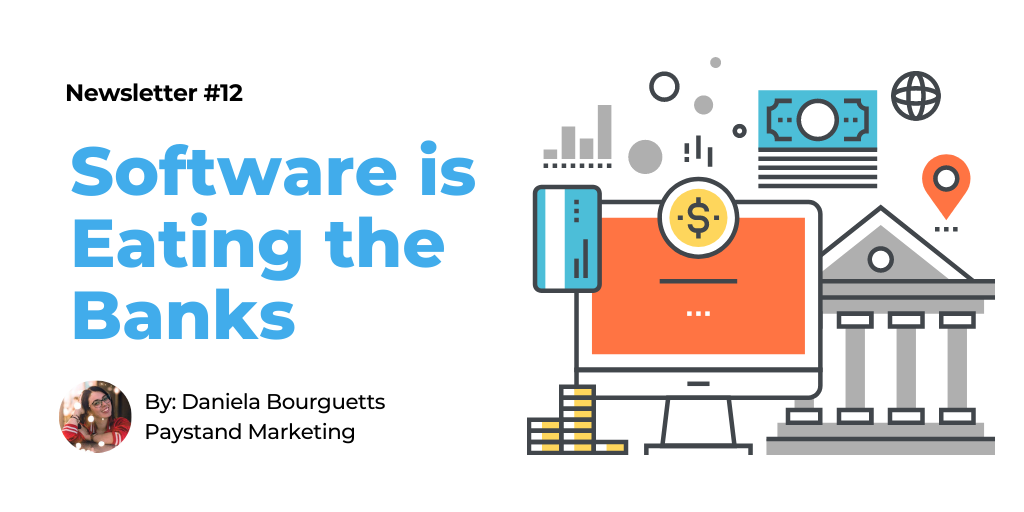Issue #12: Software is Eating the Banks

Editor’s note: Hello there, readers. In this month's newsletter, we invite you to take a pause and think of all those aspects in your life that have become software in the last ten years. From the way we consume content, to the sophisticated digital tools we use to manage daily complex financial transactions. It's no longer a material world, it's a digital one.
Here's a quick question for you: What can you do now using an internet connection and an electronic device that would have seemed impossible ten years ago?
Every day the digital realm is claiming a more prominent role in our lives. Some of the largest companies in the world are adopting fully remote operations. We all rely on multiple platforms for getting our daily dose of entertainment, and as of 2020, over 2.3 billion people are using digital wallets for shopping.
However, commercial payments are having a hard time catching up due to the complexity of B2B transactions. Read on as we explore the financial tendencies that aim to ease an outdated industry's frictions in favor of a new banking system for digital transactions between companies.
💰💻 Money as Software
Consumer finances have seen some of the most drastic changes in the digital revolution; the rise of neobanks worldwide and payment processors have now made setting foot in a bank obsolete. Our money has turned into software: a number on a screen that we can manage from our smartphones to shop, make payments, transfer funds, and boost our savings accounts.
Money has done much more than adapt to digital-first behaviors; it has become a purely digital asset in and of itself in the form of cryptocurrencies. There are currently over 4,000 cryptocurrencies on the web, a shocking increase from the handful that was present in 2013.
Bitcoin (BTC) was the first cryptocurrency to hit the market, and even though financial institutions snubbed it, today, the value of a single BTC hovers north of $50,000. Mastercard and Visa are announcing BTC initiatives, and Tesla is now accepting BTC payments, solidifying the cryptocurrency's place in our financial and cultural landscapes.
This is just the beginning.
Blockchain technologies have fundamentally altered our financial system, and decentralized finance (DeFi) will give birth to many more solutions than cryptocurrencies alone. The blockchain's ability to enable peer-to-peer payments and immutable transactions has begun to illuminate a financial future that could leave banks behind forever. The seemingly meteoric rise of DeFi and the public fascination with all things crypto just proves that the world is ready for something new.
Today, there is an incredible opportunity to alter the commercial finance landscape, and Paystand is uniquely poised to lead the way by reimagining B2B payments.
Product updates
Making the Journey to Zero a Reality
✨ What's New 🚀
- 💸 Payer Incentives: Our industry-first Payer Incentives feature is making the process of transitioning away from credit cards a very real possibility for all of our customers. It's how we're democratizing cost effectiveness and empowering businesses through transactions. Read more.
- 🔒Smart Lockbox: Paystand is taking over the traditional lockbox service. We'll collect your checks and effortlessly move them to a digital payment network. Forget manual processes and lockbox fees for good! Start using it today.
Thanks to these features, we're one step closer to bringing B2B payments into the future.
Industry Articles 📚
- NFTs, Explained. We've heard about NFTs almost everywhere over the last few weeks. To put it in simple terms, NFTs are unique tokens derived from the Ethereum blockchain (but other blockchains can implement their own versions of NFTs); they store information in a way that makes them one-of-a-kind, irreplaceable, and in some cases, very valuable. The article above by The Verge does an excellent job articulating why NFTs are the next big thing in DeFi.
- Visa Becomes First Major Payments Network to Settle Transactions in USD Coin (USDC). It's finally happening. The gap between digital and traditional currencies is starting to close. According to Business Wire, "Visa is focused on adding differentiated value to the ecosystem and making cryptocurrencies more secure, useful, and applicable for payments."
- How Outdoor Gear Retailer Cotopaxi Digitized its Back-End Payments to Keep Up With Growing List of Vendors. This article by Cotopaxi features Paystand and clearly demonstrates why companies need better technology to handle economic crises and prepare for growth under every imaginable circumstance. As our world continues to shift rapidly amidst the effects of the global pandemic, these subjects are becoming increasingly important to explore.
Social Media💬
Payment Software:B2B payment software is rarely easy to use. In fact, this has cost some of the biggest banking institutions in the world hundreds of millions of dollars. Clearly, it's time to start employing a user-first mindset when it comes to creating better banking experiences for all.
this image alone from @matt_levine's newsletter this morning about the $900M payments error by citibank explains a lot of why we need better payment operations softwarehttps://t.co/s2AabZvYF7
— Seema Amble (@seema_amble) February 17, 2021
cc @dadiomov pic.twitter.com/gEhFI1ukY7
New Banking Infrastructure: It has taken a while for the US to adopt new banking infrastructures that allow for real-time transactions, transparency, and lower costs. But now, it looks like it's finally happening.
"The key to making payments more competitive in America is to create a new network of financial plumbing: a “real-time” interbank-payment system allowing for near-instant and cheap transfers. Swathes of Europe and Asia have already done this." https://t.co/dWKlnuwSuo
— Dimitri Dadiomov (@dadiomov) March 26, 2021
Bank modernization: More companies are jumping onto the the open banking bandwagon. Perhaps the best part is that soon there will be a perfect solution for every business banking need, allowing us to leave behind the restrictive offerings we're used to seeing from traditional banking systems.
FinTechs keep the big picture of bank modernization in mind https://t.co/1CJHQdIAeG
— PYMNTS (@pymnts) March 30, 2021





